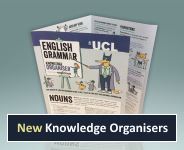Topic: Writing
The resources on writing are designed to be integrated into our overall approach to grammar teaching, which is rooted firmly in the desire to link grammar to meaning. Grammatical concepts can be taught as decontextualised, abstract ideas - and are sometimes interesting to look at in this way - but are much more effective when placed in context. Many of our writing activities draw on relevant grammatical concepts - for example, adjectives in writing to describe, and modal auxiliary verbs in writing to persuade.
Englicious contains many resources for English language in schools, but the vast majority of them require you to register and log in first. For more information, see What is Englicious?

